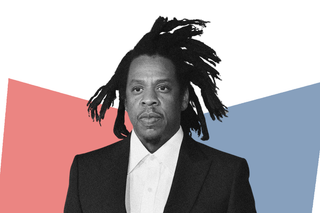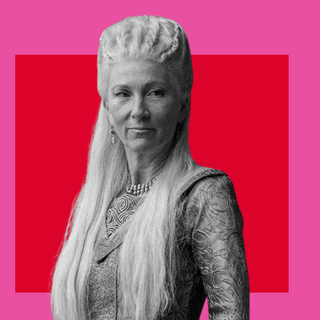
Jay‑Z Doesn’t Like ‘Eat the Rich’ Slogans. How Can Critique of Billionaires Account for Race, Identity?
“Eat the rich” isn’t a critique of capitalism — it puts the focus back on individuals.

“Y’all locked us out. Y’all created a system that, you know, doesn’t include us. We said fine. We went our alternate route. We created this music. We did our thing, you know, we hustle, we fucking killed ourselves to get to this space. And, you know, now it’s like, you know, you know, ‘Eat the rich,’ and, man, we’re not stopping, so that evolution is, you know, from us.”
These were rapper Jay-Z’s words in a Twitter space on Wednesday, where he addressed criticism of his billionaire status. The rapper took issue with being called a capitalist, even going so far as to compare it with being called racial slurs. It’s a stretch and one that shakes off accountability for the ultra-wealthy. But it also points to a tension between mainstream anti-capitalist critique, and identity politics.
Jay-Z’s comments then point to an issue that “eat the rich” slogans haven’t addressed: they paint an uncritical, ahistorical picture of wealth that doesn’t account for the intersection of class with race, gender, or other identities. In a way, they caricature the wealthy in a way that turns critique of capitalism into one centered around individuals, rather than the system itself.
Billionaires do indeed pose an urgent threat to human wellbeing: their wealth can alleviate the pain and suffering of thousands, if not millions, or other people. The criticism against billionaires is that it’s unethical to hoard resources that can instead be used to save and improve other lives — moreover, no single individual realistically needs that much for themselves. There’s then an easy crop of billionaires to hate: Jeff Bezos, Elon Musk, and even Bill Gates, all represent the type of billionaires who hoard despite being born into and inheriting privilege on nearly every axis of identity. They’re all white, cis men — already at the top of the social hierarchy, and subject to very little structural oppression even before their acquisition of untold riches.
Then, there are those who don’t fit these identity markers, but who helm corporations that are destructive and inherently exploitative of people, land, resources, and the environment. The rise of Gautam Adani to the position of the third-richest man in the world is an example of this.
Related on The Swaddle:
New Research Shows Most People Don’t Want to Be Billionaires
But then, there are those who have risen to the status ostensibly without exploiting others in quite the same way: Rihanna, Jay-Z, and LeBron James are all individuals whose wealth is a result of their art and sport. “We’re not gonna be tricked out of our position,” Jay-Z added. These individuals are much harder to hate — they don’t seem as bad; in fact, some, like Rihanna, have been called “good billionaires.” It’s with this class of billionaires that existing mainstream critique falls short: it ties an overall critique of wealth with the qualities of an individual. This turns what should have been a structural conversation into a personalized one — and “eat the rich” becomes a slogan that comes with caveats about which rich people, exactly, we’d like to eat.
When Jay-Z is able to draw on experiences of marginalization by race as a defense against the criticism of his wealth, it points to a shortcoming in the criticism itself. When we’re too focused on demonizing people (however satisfying that can feel), we lose out on understanding just how and why they came to be the way they are. And the idea of the “good” or even “decent” billionaire then doesn’t allow us to ask questions of the economic order at large: why are some people able to have so much while others starve? The easy answer would be to blame individual greed, but this allows room for the notion of unproblematic billionaires like Rihanna — a notion that, arguably, shouldn’t exist.
Scholars have, moreover, addressed the intersection of other forms of identities with class, which makes Jay-Z’s impassioned defense of himself weaker. Philosophers like Olúfẹ́mi O. Táíwò have called it “elite capture” — about how identity-based politics have been usurped by elite interests to keep the status quo intact. In simpler terms — there’s a model of racial capitalism at play that makes it seem liberatory for a few black (or otherwise systemically marginalized) people to enter rooms of power, than to abolish the rooms themselves.
Billionaires should not exist. Fixating on the morality of individual billionaires may undermine this larger ideological commitment. It asks for good conduct and intention of people with staggering wealth, without questioning the ethics of all that wealth being concentrated in the hands of one person. Popular slogans like “eat the rich” then don’t allow for nuance in thinking about wealth inequality — instead, they’re undermined by their own insistence on fixating on a few people within a fundamentally broken system.
Rohitha Naraharisetty is a Senior Associate Editor at The Swaddle. She writes about the intersection of gender, caste, social movements, and pop culture. She can be found on Instagram at @rohitha_97 or on Twitter at @romimacaronii.
Related


Allegations of Inappropriate Conduct at Nickelodeon Raises Debate on Banning Child Acting
